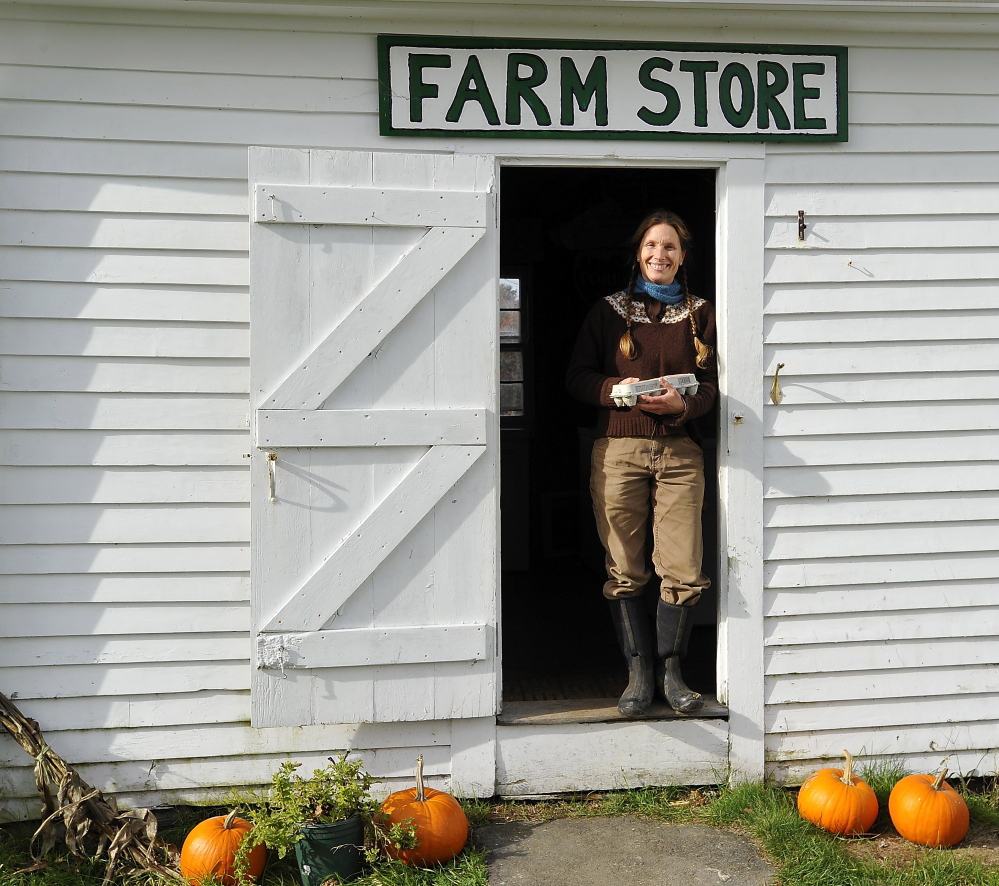Farmer Laura Grady runs Two Coves Farm in Harpswell with her husband, Joe, their three children (Yvette, 13, Muriel, 11, and Joe Pye, 7). Formerly owned by a longtime Harpswell family, it was known as the Dunning Farm until the Gradys arrived in 2009.
They don’t own the place; Two Coves is a Forever Farm, managed by Maine Farmland Trust (a local family that prefers to remain out of the public eye purchased it in 2006 to protect the land). It’s the only commercial farm operating in Harpswell today, but long ago, the neck was jammed with farms, particularly dairies.
Source checked in with Grady to talk about her beef cattle, border collies, egg CSAs and the secrets to fishless fish chowder.
FATHERLY INFLUENCE: What brought her to farming? “My dad grew up on a farm in western Maine, and I grew up hearing about it all the time. My dad was sort of like a professional Mainer, he did a little bit of everything – some woods work, he fixed stuff, he was a mechanic. I definitely grew up in a rural setting. Just not with this many animals.”
DAUGHTER’S CHOICE: She graduated from the University of Southern Maine with a degree in history. “After college I was just really interested in food and good food and wanting to grow our food. It was early in the food movement, because I am only 42. It is way more popular now.” (As evidenced by Two Coves’ garden manager and apprentice, both in their 20s.) “When we started it was ‘Oh, you’re crazy. Like, what are you doing?’ ” And now it’s chic, right? “Yes! It’s kind of weird.”
She apprenticed, including with seed-saving guru Will Bonsall, and then she and Joe bought a homestead in Hiram. They also did a stint as teachers and farmer managers at a now-defunct Quaker school in New Hampshire, where Joe developed his fascination with beef cattle. “We’ve just learned as we went.” After that, they went back to Hiram for a few years and realized they had run out of space. “So we started looking around again, wondering, what else is out there for our crazy need to farm?”
NAMING RIGHTS: Enter Two Coves, which sits on 88 acres, about 20 of which slope down to Mill Cove and look out over High Head, one of the more fashionable Harpswell addresses (for non-farmers). The fields are green, rolling and lush. “This is beautiful soil,” Grady said. “Incredible, actually.” Behind the farmhouse, circa 1800, is the rest of the land, which looks out on Widgeon Cove. Hence the farm’s name.
WHO DID YOU HAVE TO KILL? Was it competitive to land the leasing rights? “We looked at it online and were like, ‘No way,’ ” she remembered. “We thought there might be a line of people submitting business plans, but there really weren’t. I don’t know why it happened the way it did, but we really liked the landowners and they liked us, and they thought our business plan looked fine. I really did not want to have a board, or higher-ups telling us what to do. And they agreed, they were like ‘We don’t know anything about farming. Do what you want.’ ”
AND THAT WOULD BE: A little haying, some vegetables and a summer art/farming camp for young children. But mostly the Gradys raise livestock and poultry. They have lambs (favoring a black-faced variety called Clun Forest), a lot of laying hens, some ducks, 18 head of Belted Galloways, a milking cow named Clover (and her offspring), some fine pigs, including some sublimely cute black piglets. Then there are the bunnies for the children, three border collies that Joe Grady shows at fairs around the state and one Maremma crossbreed who watches the chickens with unerring dedication.
WHO IS SHE SAVING THEM FROM? “Coyotes mostly,” Grady says ruefully. “Poultry predation is our biggest problem.” There are a lot of coyotes on Harpswell neck, she says, and there’s nothing quite as enticing to a coyote as chickens. The border collies are intended to herd the sheep and cattle, and they’re helpful with the poultry as well, but less as night watchmen than an escort service, “especially if a storm is coming or it’s getting dark,” she said. “I don’t know how people farm without dogs, I really don’t.” Then she excused herself – “I have to stir the chowder” – and returned with two steaming mugs to share. (The chowder tasted of fish and fresh carrots and potatoes but was fish-less. Grady barters eggs with a local fisherman, and if the fish she gets is rubbery, like cusk, she discards it when the chowder is cooked.)
ON FALL FATIGUE: The farm store is nearly cleared out, but for the eggs (the Gradys run an egg CSA, $50 for 10 dozen, picked up as you need them) and some skeins of yarn. She’ll be at the winter market in Topsham on Fridays, selling eggs, preserves and meats, but it’s time to shut down the store for the season. “When it comes to the end of September I am just about ready to collapse. The days just don’t end. You get up at 5, take care of the kids until 6, then go out and milk and by the time you are done closing in chickens or turkeys or whatever it is, it’s 9. Or 9:30. And God help you if the sheep or cows get out in the middle of the night.” It’s funny though; she looks awfully happy as she’s saying all this.
Send questions/comments to the editors.





Comments are no longer available on this story